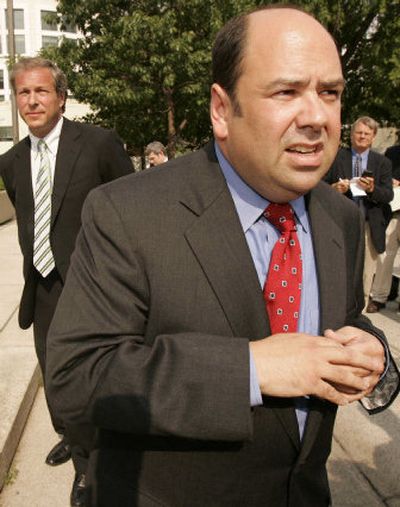Time magazine to give notes to judge

Time magazine will hand over reporter Matt Cooper’s notes to a federal judge today. The move was criticized by media watchers and the New York Times, where reporter Judith Miller faces jail along with Cooper for refusing to divulge sources in a probe into the leak of a CIA officer’s identity.
Time said in a statement that its decision, intended to keep Cooper out of jail, makes it unnecessary for him to testify and “removes any justification for incarceration.”
Monday, the Supreme Court refused to hear appeals by Cooper and Miller. The two have been cited for contempt by U.S. District Court Judge Thomas Hogan as part of a grand jury investigation into the leak of undercover CIA agent Valerie Plame’s name. On Wednesday, Cooper and Miller could be sentenced to 120 days.
The case pits reporter confidentiality against a prosecutor’s need to investigate crimes. It follows several recent instances in which reporters were jailed or threatened with incarceration for not revealing their sources. Rhode Island television reporter Jim Taricani recently served a term of home confinement for refusing to say who gave him an FBI surveillance video of a local politician taking a bribe. This week, four reporters were threatened with jail time for refusing to disclose their sources in the Wen Ho Lee spy case.
According to Time, “the same Constitution that protects the freedom of the press requires obedience to final decisions of the courts and respect for their rulings and judgments.”
In an interview, Time Inc. Editor in Chief Norman Pearlstine said that handing over the notes is “an appropriate thing to do, having fought very hard” in court. “It wasn’t about the size of the fine, even about Matt’s going to jail, which he may still end up doing. But I could not make the distinction that said: We are somehow above the law. Now if that’s caving, so be it.”
Arthur Sulzberger Jr., publisher of the New York Times – where Miller, but not the paper, is party to the case – said that he was “deeply disappointed” by Time’s move.
“We faced similar pressures in 1978 when both our reporter Myron Farber and the Times Co. were held in contempt of court for refusing to provide the names of confidential sources. Mr. Farber served 40 days in jail, and we were forced to pay significant fines,” he said.
Paul Levinson, a Fordham University communications professor, said that while “humane reasons” – keeping Cooper out of jail – probably figured into Time’s decision, it sends a “bad message” to the rest of the news media, especially smaller outlets with less editorial clout than Time.
“How is some local paper in a rural state going to find the courage to stand up to this kind of thing if Time doesn’t have the courage?” he said.
Cooper said he would prefer that Time not hand over the notes, but he would understand if the magazine did.
Syndicated columnist Robert Novak, who in a 2003 article disclosed Plame’s identity citing unnamed administration officials, has refused to discuss any details of the case. He told CNN on Wednesday that he will “reveal all” he knows after the matter is resolved and that he thinks it’s wrong for the government to jail reporters.
Quinnipiac University professor Paul Janensch said Time acted correctly: “A news organization is not above the law.”
Janensch was city editor of the Courier-Journal of Louisville when reporter Paul Branzburg refused to give a grand jury the names of drug users he interviewed for stories about the drug culture. That led to a historic 1972 ruling by the Supreme Court that Branzburg had to testify. But by that time he had left the newspaper, and the local prosecutor declined to pursue the case.